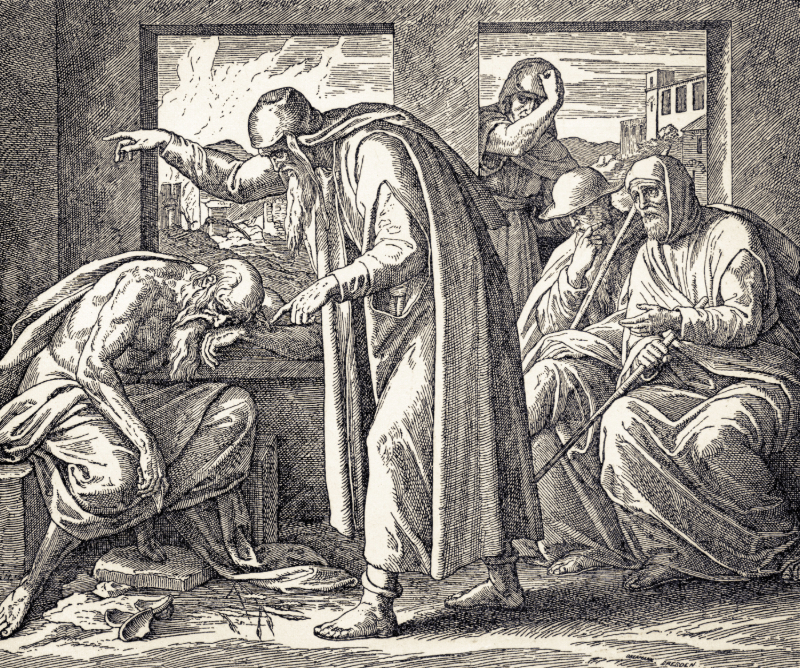During the time when the people of Israel were enslaved in Ta Kemet (the Black Land), and Prince Moses, the great scribe, had taken refuge among the northern Arabian tribe of Midian, a captivating story shared by the campfire caught his attention. It was the tale of another prince who, like him, had suddenly lost everything.
In the Land of Uz, four camel-days to the north, where the tribes of Edom—descendants of the same forefather Abraham—dwelled, lived the renowned Emir Ayyub. Ayyub was an extraordinary man, beloved by both the great Allah and by the people, blessed with many children and vast herds, pure in heart like the azure sky, and the most respected senior in his city. Unlike other eastern nobles, landowners, and masters of human herds whose names have long rotted away in obscurity, Ayyub lived in the fear of God. He helped the poor and was constantly mindful of his children’s spiritual well-being.
No one could find fault with the emir—not even the angels. God Himself found no fault in him before the heavenly council. In fact, He even boasted of Ayyub and had the “impudence” to wager on his loyalty when challenged by the Adversary. The wicked Djiblis insinuated that under certain circumstances, the emir would turn against God and curse Him. But the Lord of heaven was willing to bet that Ayyub (whose name means “the persecuted”) would never betray Him. The stakes were high; the true motivations behind genuine faith and God’s moral right to be the Sovereign of the earth were at play.
The calamity
One day, a series of unimaginable misfortunes suddenly struck the emir. The Sabeans stole his oxen and donkeys, lightning struck down his flocks along with their shepherds, the Chaldean hordes seized his camels, his servants were killed, and all ten of his children perished beneath the ruins of the house where they had gathered. Faced with his wife, who was driven mad by the news, the emir, speechless, fell to the ground, his head shaved and his clothes torn, whispering his prayer: “Naked I came from my mother’s womb, and naked I will return there! Allah natan, Allah laqah! Yahiw shim Allah mubarak!” The scribe records here that, despite these unparalleled losses, he did not curse God.
Djiblis fumed with frustration, but a bet was a bet. The challenge had to be taken to the end, so at the next meeting, he managed to extract yet another concession from the Lord. (These moves would be compensated someday, according to the holy law of talion!) Like a vulture descending from the sky, the Adversary swooped down to do his work. The days of mourning hadn’t even passed when, out of nowhere, a grievous plague struck the emir, causing his entire skin to crack and ooze, with unbearable itching and burning.
Ayyub went outside and sat on a heap of ashes. One hand swatted away flies, while the other clutched a shard with which he incessantly scratched himself. He groaned, his skin trembling on his bones, food had lost its taste, water was brackish, and his tongue was parched. From time to time, his body was wracked by dry sobs; he had no tears left to cry.
Yet Ayyub resisted the temptation. For decades of marriage, they had received nothing but happiness from God. How could he now blame God in his time of suffering?
The emir’s wife—let’s call her Budrulbudur—had lost her faith and was bereft of hope. Weary of their misfortunes and her husband’s unwavering devotion, she erupted in bitter reproaches against Ayyub and the Almighty, urging her husband to curse God and end this “life” swiftly.
The few remaining servants had vanished. A group of vagabonds—sons of troglodytes whom the emir had once helped—gathered to hurl insults at him. From time to time, birds screeched and cawed overhead. Passersby kicked dust in his direction and shook their heads. “Serves him right,” they muttered. “The rich man who had it all, living in luxury and fine clothes! What goes around comes around.”
In such dire circumstances, the only solace left to a man is the hope in God and the resurrection of the righteous. But the emir felt that even God no longer heard him, that even the barking of the neighbour’s dogs was more convincing than his prayers. As for the resurrection of the righteous, he had heard whispers of it from the elders, but it seemed too good to be true. The thought that the God he loved, to whom he had dedicated his life, had abandoned him and no longer gave him any sign of His presence, was the final blow to his suffering.
Friends
Three friends of the emir came from afar to visit Ayyub and show their sympathy. They had heard of his misfortune and had agreed among themselves to see him. But when they arrived, they scarcely recognized him. According to the customs of the time, they tore their clothes, lamented loudly, and threw dust into the air over their heads. Ayyub, overwhelmed by his own despair, did not recognize them. Were these his last hallucinations? What could come next but even greater calamities?

Grasping the gravity of the situation and adhering to the ancient custom of not speaking to a person in distress until they speak first, the three friends prostrated themselves on the ground. They remained in this position, fasting and silent, for an entire week. The emir could not sleep, his head burned with fever, and at times he drifted into delirium. But the gesture of his friends eventually caught his attention. This was no vision, nor was it another mockery from vagrants. It was them: Ili-paz from the Temanite clan in the south, Bildad from the clan of the Shuhites, and Zophar from the clan of the Naamathites—old friends. Yet Ayyub’s suffering was so profound that, instead of appreciating their sympathy, he began to curse his days and wish for death.
After a week of rare empathy and dense silence, they finally dared to speak to him, beginning with the eldest and ending with the youngest. The dialogue between the emir and his friends was later rendered into verse by the great scribe. However, it is understood that Ayyub and his friends were not engaging in poetic disputes on that heap of ash.
Beneath the layers of metaphor lies the theological moralism of these men, who cared enough for their friend to help him repent and thereby change his fate. They sought to convince him of some presumed guilt. Such calamities, they reasoned, could not befall an innocent man. He must have done something wrong.
Like any wealthy man, he must have exploited the downtrodden and failed to empathise with the needy. His children? They must have been revellers and debauchees—why else would calamity strike them precisely while they were drinking their “new wine”?
Ayyub, they reasoned, had shown no mercy to the naked, and now here he was, stripped bare and left to fate. “What goes around comes around” they thought. And if they hadn’t been sincere and caring, they wouldn’t have travelled great distances to see him, nor fasted for days with their faces to the ground, murmuring prayers on his behalf. Ah! He hadn’t committed any of these sins? Well, every human has lapses, slip-ups, omissions, and small sins that they commit unknowingly and never get around to explicitly repenting for. Plus, there’s the original sin, the sin of all sins, embedded in our very flesh and blood. You’re already born as a horrible bundle of sins, involuntarily drawing God’s wrath. And, you see, some inherit more burdens than others. Surely, the “Accursed One” must have some hidden guilt—there’s no other explanation!
The emir’s friends made great sacrifices for him, so when we criticise them, we forget that we wouldn’t be capable of following their example. They were among the best people to walk the earth. I bow with humility before these true believers. They were men of God, even if Satan tempted them to say provocative things.
Yet, it seems telling that the same people who are sensitive and empathetic, ready to pray, fast, and mourn in the face of physical pain, completely flip when confronted with what they perceive as heresy or spiritual distress, which can sometimes be even harder to bear. The emir was a critical and clear-minded man, despite his faith, while they were trapped in moralistic platitudes. They feared the obvious, they feared to think, and they were unwilling to give their friend the benefit of the doubt. The inherited theology had to remain intact. Truth could not be anything other than what they had heard from their elders and the caravan merchants. As the saying goes, “You reap what you sow”—if misfortune has befallen you, it must be because you’re a scoundrel. Three against one.
Sin and evil
But the emir couldn’t see himself as guilty. He had lived an exemplary life. While he didn’t claim to be without sin, he found nothing to reproach himself for. What he felt was more like a persistent sense of baseless accusation, a nagging conscience that you want to silence but can’t. He had made some mistakes in his youth, but he had grown wiser and was certain that God had forgiven him. Now, these past errors resurfaced in his mind, and with a mix of laughter and tears, he addressed the Sovereign Lord:
“For you write down bitter things against me and make me reap the sins of my youth” (Job 13:26).
He couldn’t believe that God would be vindictive, but he also didn’t know just what to believe anymore.
The debate among the wise men grew increasingly heated. Repeating their ideas only strengthened their own convictions. On one side stood firm tradition, morality, and orthodoxy: three against one. On the other, a pitiful individual who believed he was right and was ready to take God to court; a man who seemed to hold little respect for the authority of the Ili-pazes, Bildads, and Zophars, nor for the experience and visions they invoked.
The whole world recognized the truth in what they said. “Go ask the caravan travellers, and you’ll see it’s true. Ask all the elders, and you’ll be convinced.”
The ravens and vultures circling in the sky nodded in approval. The worms that had begun to assail his skin echoed an “amen” to the words of his friends. But the emir seemed to have become a humanist, a critical rationalist, perhaps even a rebel. His realism frightened them. His clarity shook their convictions, which only made them intensify their pressure.
Ayyub observed that, more often than not, things happened in ways that defied justice. It wasn’t true that the corrupt were plagued by misfortunes while the honest were basking in prosperity. Often, the world was upside down, and he couldn’t understand why. He longed for God’s judgement to set things right. Allah is a just judge; He gave us life and happiness. In Him lies hope, even after the skin falls away, the flesh rots, and the soul is choked in the dust of the other realm. There must be a just judgement and a resurrection.
The insights of Bin Barakīl
In the end, a fourth figure enters the scene— Ili-Hú bin Barakīl, from the clan of the Buzites, perhaps a distant relative or some other kin. Being younger, he hadn’t had a chance to speak, as the elders had much to say, and Ayyub constantly defended himself, leaving no room for others to intervene. Ili-Hú simmered with frustration, annoyed by the philosophical impotence of the speakers. Neither the moralistic sages were right, nor this defiant sufferer. Finally, when Ayyub’s three friends, having exhausted all their arguments, fall silent, Bin Barakīl begins to speak.
In the great scribe’s book, Ili-Hú is not referred to as a friend. But the young man is highly intelligent. Everything he says makes sense. He distances himself from the traditions of the elders, as one would expect from someone his age, and he is skilled in the art of rhetoric and philosophy. He introduces a new perspective, one that aligns with the truth. According to the young man, it is not true that God is punishing the emir for his sins—neither for those of his youth, nor for human errors, nor even for original sin or the guilt of simply being born. Instead, God is testing Ayyub. Therefore, he should cease his wailing like a wild donkey, stop asking uncomfortable questions of Allah, and instead renew his covenant with Allah, for in due time, his happiness will be restored.
The Almighty’s plea
Yet, the emir remained unconvinced by Ili-Hú’s discourse. As everyone reached the limits of their endurance and fell silent, a sudden whirlwind arose, drawing nearer. From within the swirling column, the voice of the patriarchal Deity was heard, addressing the suffering one directly. When people run out of arguments, God has a thousand more. Ayyub had called upon Allah’s presence and judgement. And now, Allah had arrived.
Instead of answering the anguished questions of the suffering man, the Lord responds with a barrage of His own. If you are wiser, if you have superior solutions, then let Me ask the questions, and you answer. In a dizzying succession of poetic imagery, the Lord unveils the divine beauty and wisdom manifest in nature. He vividly describes various phenomena and creatures, emphasising His unique qualities as creator and sustainer while deliberately overlooking the monkey. Intimidated and humbled by this display of power, yet still unconvinced, the emir replies:
“I am small, and You are great;
What can I say? Better to stay silent.
I clasp my hand over my mouth.
You do as You wish; what can I do?”
Clearly, the Lord is not satisfied with Ayyub’s response. It’s merely an acknowledgment of defeat, a voice of helplessness: Allah is great, and there is no other; He is right because He is powerful.
God challenges Ayyub once more with questions and vivid images from nature. This time, He artfully presents only the behemoth and leviathan, two creatures teetering on the edge of reality and fantasy, or rather exaggerated versions of two animals familiar to His audience: the hippopotamus and the crocodile. The heavenly speaker toys with these images, displaying a fine sense of irony. He asks the emir: Could you catch the mighty leviathan with a fishing line and turn it into a pet to amuse your little girls? To Ayyub, this was dark humour. His daughters were gone. Who was there to bring a lamb to—let alone a leviathan! Ten children, Lord, and all ten gone in a single day!
Repentance
But the emir becomes increasingly attentive to the speech, allowing himself to be carried away by the beauty and wisdom of the description. He grasps more from it than we might, and when the Lord finishes speaking, Ayyub acknowledges his defeat and is convinced. Yes, he had sinned by suggesting that God might be unjust. The righteous Ayyub had no right to obscure God’s justice with his own justice. He also realised that salvation comes only from the Great Maker, for He is the caretaker of all creatures—He, our Father, the Father of us all.
How is it that the emir was not convinced by his friends’ empathy, their traditional arguments, or even the brilliance of the last speaker, yet was persuaded by the Creator’s discourse on His achievements in the natural world? Although this sermon did not convince him immediately, the repetition of the theme eventually brought conviction, repentance, and reconciliation with God. This is why God gave humanity the week, crowned by the seventh day, so that we might repeatedly remember our Creator and secure our peace with Him.
The Book of Job and the concept of the week are among the oldest relics of the Abrahamic tradition.[1] It is no coincidence that the text refers to a span of seven days (Job 2:13).
After a week of silence, the dialogue between the emir and his friends resembles a Bible study class where everyone is a teacher, few actually read, and the subject remains unresolved. Following this, God Himself delivers a sermon from the pulpit of the storm, with a thousand questions beyond human answers and vivid projections from nature.
By echoing the rhetorical challenges of the Heavenly Preacher and responding with repentance for having questioned God’s character, Ayyub humbles himself on the ash heap, his forehead in the dust. He acknowledges his sin of allowing suffering to drive him to express doubts about God’s mysterious actions and admits that he dared to discuss matters about which he knows nothing.
Yes, he was aware of the Creator God, but all he knew and had seen was like a lesson learned by hearing, compared to what he now understands. Ayyub confesses that only now has he truly seen God, even though he had witnessed nothing more than a whirlwind of dust. It wasn’t the beauty of the voice he heard, nor its intensity or timbre that brought him conviction, but a thought that had crept into his heart while the Almighty spoke. “Therefore I despise myself and repent in dust and ashes” (Job 42:6).
God is angry with the three friends who failed to speak as rightly about Him as Ayyub did. He addresses Ili-Paz, the first elder who initiated the committee filled with insinuations against the emir. They had even resorted to lies to defend God (Job 13:7).
But divine judgement vindicates Ayyub, who placed his faith more in future judgement than in earthly justice, where reality does not always align with the views of the best theodicists, and God’s justice is sometimes difficult to prove.
Notably, God’s displeasure is directed only at Ili-Paz and his two friends. The young Ili-Hú is not mentioned. Like many young people, the impatient youth arrived late and seems to have left before the divine service concluded. Or perhaps he stayed, unnoticed? To be young, to be right, to manage to get a word in, only to be ignored by both the listeners and even God! This son of Barakīl isn’t counted among the friends or enemies of the emir. He isn’t numbered among the righteous and wise, nor among the foolish in need of repentance.
Ili-Hú is treated like a mere child, expected to grow up before being taken seriously. He climbs the pulpit and asserts all kinds of correct things that surpass the wisemen of the time, yet he doesn’t understand suffering as he hasn’t walked through the valley of shadows and doesn’t know the pain of the afflicted. He didn’t spend seven days on the ground like the emir’s friends; he is an intruder in the scene. On the other hand, Ili-Hú seems like a true angel, heralding the word of the Lord. Yet Ayyub could no longer distinguish between abstract angels and demons. Every fragment of his soul and body hurt too much.
Sacrifice, reconciliation, and restoration
God surprises the moralising friends by decreeing that, for their sin, they must offer a communal sacrifice at their own expense: seven bulls and seven rams, to be sacrificed while the emir acts as the priest, burning the offerings on an altar in honour of the Heavenly Sovereign and praying on their behalf. The three friends were thus forgiven for their “folly,” thanks to their suffering friend, but not without a sacrifice. However, God did not ask the emir for any sacrifice—perhaps because he had nothing left to give.
I imagine Budrulbudur was there too, listening to the sermon from the storm. God does not reproach her either. But neither does He ask her for a sacrifice or explicitly reprimand her. Her rebuke will come through the healing God brings to her husband, and she will repent. The emir truly loved his wife. With his resources, he could have easily acquired many women, as was customary. But she had given him many children and shared with him decades of happiness, not just this profound misery. How could he think of another love in his time of suffering when, even in his days of health and wealth, he hadn’t allowed himself to desire another woman in his heart (Job 31:1)?
After the emir offered the sacrifice and prayed for his friends, God healed him. He, too, needed to forgive and understand. The Lord blessed Ayyub twice over. First, He restored his relationships: brothers, sisters, and friends, who had not visited him during his time of trouble, now came with gifts and shared a meal with him, like at a feast for one who had been resurrected from the dead.
The blessings in the second part of Ayyub’s life increased. His flocks of sheep, camels, cattle, and donkeys were doubled. There was, however, one treasure that wasn’t doubled: the number of his children.
As for the children who had died, none were truly lost. The emir’s children were not reckless spendthrifts like the prodigal son in the parable (Luke 15:11-32), nor like the stubborn brother who, despite receiving a double portion of the inheritance, complained that his father hadn’t given him even a young goat to celebrate with his friends and wasn’t happy to share the fatted calf with his brother. It is remarkable that ten siblings, instead of seeking their own pleasures, chose to celebrate together. This is the sweetest and most sacred form of religion, akin to the sanctification of the high priest (Psalm 133, 132).
After his recovery, Ayyub lived another 140 years, reaching a total lifespan of about 200 years—double that of his contemporaries—and witnessing the births of his great-great-grandchildren. Throughout this long life, his days of misfortune spanned only a few weeks to a few years. His trials ultimately doubled his earthly blessings, a foretaste of the incomparable heavenly blessings to come at the resurrection of the righteous. Then, he will learn that the Redeemer, who spoke to him from the storm, “stood upon the earth” in the end, lived a righteous life, endured unparalleled suffering, sacrificed Himself for sinners, and prayed for the forgiveness of His friends. On that day, the blessed Ayyub will reunite his children—both those resurrected and those still living—at a banquet where the heavens will never collapse.
Curse and die? No! Bless and live!




















